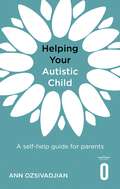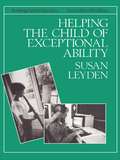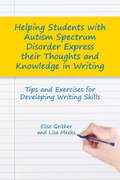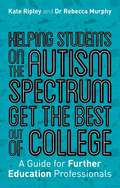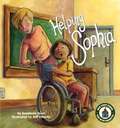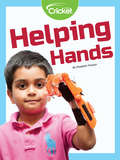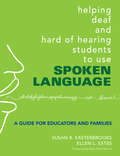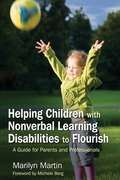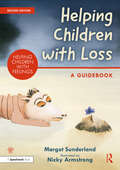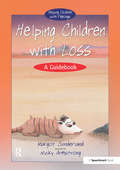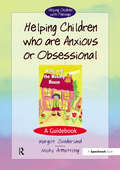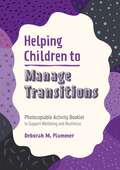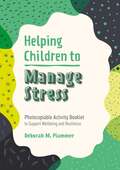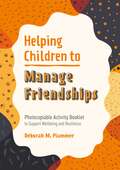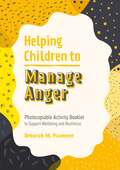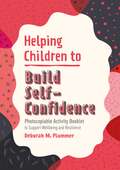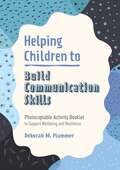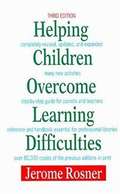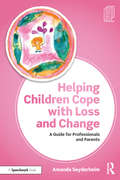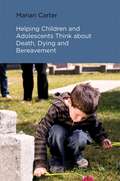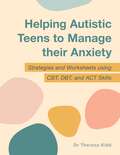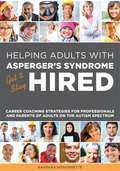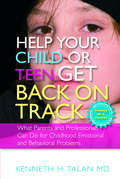- Table View
- List View
Helping Your Autistic Child: A self-help guide for parents (Helping Your Child)
by Ann OzsivadjianPractical, evidence-based advice for managing distressed behaviours and common situations involving autistic children. Autism affects about one per cent of the population, and whilst it can present very differently among individuals, there are some common challenges faced by autistic people. This self-help guide focuses on practical, proven techniques to help parents support their autistic children with commonly experienced areas of difficulty. Written by authors with extensive experience in research and in working clinically with children with a wide range of neurodevelopmental differences, this book uses a strengths-based approach to guide parents in helping their children to enhance their skills, as well as to manage some common challenges.This book will help you to: · Support your child through anxiety and social interaction issues · Manage sleep problems and feeding difficulties · Understand sensory responses in autism · Understand and manage distressed behaviour, including self-harm and demand avoidanceHelping Your Child is a series for parents and caregivers to support children through developmental difficulties, both psychological and physical. Each guide uses clinically proven techniques. Series editors: Dr Polly Waite and Emeritus Professor Peter Cooper
Helping Your Autistic Child: A self-help guide for parents (Helping Your Child)
by Ann OzsivadjianPractical, evidence-based advice for managing distressed behaviours and common situations involving autistic children. Autism affects about one per cent of the population, and whilst it can present very differently among individuals, there are some common challenges faced by autistic people. This self-help guide focuses on practical, proven techniques to help parents support their autistic children with commonly experienced areas of difficulty. Written by authors with extensive experience in research and in working clinically with children with a wide range of neurodevelopmental differences, this book uses a strengths-based approach to guide parents in helping their children to enhance their skills, as well as to manage some common challenges.This book will help you to: · Support your child through anxiety and social interaction issues · Manage sleep problems and feeding difficulties · Understand sensory responses in autism · Understand and manage distressed behaviour, including self-harm and demand avoidanceHelping Your Child is a series for parents and caregivers to support children through developmental difficulties, both psychological and physical. Each guide uses clinically proven techniques. Series editors: Dr Polly Waite and Emeritus Professor Peter Cooper
Helping the Child with Exceptional Ability (Special Education Ser.)
by Susan LeydenFirst Published in 1985. Routledge is an imprint of Taylor & Francis, an informa company.
Helping Students with Autism Spectrum Disorder Express their Thoughts and Knowledge in Writing: Tips and Exercises for Developing Writing Skills
by Lisa M. Meeks Elise GeitherWhen it comes to academic work, students with Autism Spectrum Disorder (ASD) often have the required knowledge but struggle to get their thoughts down in writing. This is a practical guide to teaching and improving writing skills in students with ASD to meet academic writing standards and prepare for the increased expectations of higher education. The book covers key considerations for all educators teaching writing skills to high school and college students with ASD including how to address difficulties with comprehension, executive functioning, and motor skills, how to structure ideas into a coherent argument, and how to develop creativity and expression in writing, as well as how to successfully adapt these skills to meet university expectations. Each chapter includes teaching tips, insightful student perspectives, and ready-to-use writing exercises.
Helping Students on the Autism Spectrum Get the Best Out of College: A Guide for Further Education Professionals
by Kate Ripley Rebecca MurphyThis is the companion guide for further education staff working with students on the autism spectrum who are using Getting the Best Out of College for Students on the Autism Spectrum: A Workbook for Entering Further Education.The workbook takes a holistic approach and focusses on the practicalities of college life for autistic students transitioning to further education, as well as those already there. It covers everything needed to support autistic students including getting to college, how to handle new sensory issues, peer relationships, where to go for help, time management, and exam anxiety.This guide follows the structure of the workbook Getting the Best Out of College for Students on the Autism Spectrum. For each chapter, there is a parallel chapter in the student guide that directly addresses the students' needs. This guide includes case studies, contextual information and frameworks to help adults work through the exercises and interactive elements with the student.
Helping Sophia
by Anastasia SuenThe students in Miss K's class experience situations that occur in schools everywhere. When Sophia's helper is absent, her fellow third-graders help out by learning how to push her wheelchair. Sophia's story teaches about caring, kindness, and children with disabilities with brilliant illustrations and humorous text. What Do You Think? quetions, Miss K's Classroom rules, and a glossary aid teachers in classroom discussions about the character trait of caring featured in this stunning picture book. Special thanks to content consultant Vicki F. Panaccione Ph. D.
Helping Hands
by Elizabeth PrestonSome kids are born missing a hand or fingers, others lose them because of accidents. Find out how people are printing artificial hands on 3-D printers to help those who need a hand. They are cheap, easy to build, and really work!
Helping Deaf and Hard of Hearing Students to Use Spoken Language: A Guide for Educators and Families
by Susan Easterbrooks Ellen L. EstesBased on the authors' model of auditory, speech, and language development, the book provides educators with effective techniques and strategies for working with children in the primary grades.
Helping Children with Nonverbal Learning Disabilities to Flourish: A Guide for Parents and Professionals
by Marilyn Martin Zion`Imagine getting lost in your own home, forgetting where the bathroom is at work, or being unable to operate a simple door knob. These are just some of the myriad challenges faced by individuals with a Nonverbal Learning Disability, or NLD...In Helping Children With Non-Verbal Learning Disabilities to Flourish, Marilyn Martin gives an overview of NLD and strategies for teaching individuals with this disability. Using examples of her struggles to help her daughter, who has NLD, as well as current research, she has written a book helpful for both parents and professionals. In addition to her experiences with her daughter, Martin is a Learning Specialist with more than fifteen years of experience working with students who have dyslexia, NLD, and other learning disorders... This book is a good introduction to NLD and interventions for treating it... As it gains recognition as a distinct learning disorder, interventions and informative books, like this one, will open doors, literally and figuratively, for families and individuals touched by NLD.' - Foreword, Autumn 2007 `Author Marilyn Martin's daughter Sara was diagnosed with Nonverbal Learning Disability (NLD). Marilyn offers a comprehensive developmental profile of children with NLD and explores the controversies surrounding the condition so parents and professionals can identify learners with NLD and ensure they receive early intervention. Offering practical advice on NLD at home and at school, the book describes step by step interventions for improving a range of skills from penmanship to social acumen.' -Autism Us, 2007 `Marilyn Martin's book Helping Children with Nonverbal Learning Disorder to Flourish is an exciting and essential new addition to the literature. ... Martin shines in her ability to match interventions to a broad range of problems and examples abound in every chapter. Clear, concise, and detailed explanations are given so that the interventions can be applied skillfully. ... Each intervention is presented in a terrifically useful and usable format that includes the problem, strengths available, proposed solution, how the solution can be generalized, the goal of the intervention, and a very up-to-date and helpful listing of relevant resources.' - from the Foreword by Michele Berg, Director, Center for Learning Disorders, Family Service and Guidance When you continuously cannot find the bathroom in your best friend's house, or you cannot print the letter `t' when all your friends are writing volumes, you notice, and you ask questions. So it was for Marilyn Martin's daughter, Sara, who was diagnosed with Nonverbal Learning Disability (NLD). This book skilfully combines a comprehensive guide to NLD with the inspiring story of how Sara transformed herself from that young girl whose existence seemed darkened by learning difficulties into the capable young woman she is today. In Helping Children with Nonverbal Learning Disabilities to Flourish, Marilyn Martin presents a comprehensive developmental profile of children with NLD. She explores the controversies surrounding the disorder so parents and professionals can identify learners with NLD and insure they receive early intervention. Offering practical advice on NLD at home and at school, she describes step-by-step interventions for improving a range of skills from penmanship to social acumen. This book is essential reading for parents and professionals working with children with NLD.
Helping Children with Loss: A Guidebook (Helping Children with Feelings)
by Margot Sunderland Nicky ArmstrongNow in a fully updated second edition, this professional guidebook has been created to help adults provide emotional support for children who have experienced the loss of somebody they know, or something they loved. Written in an accessible style and with a sensitive tone, Helping Children with Loss provides adults with a rich vocabulary for mental states and painful emotions, paving the way for meaningful and healing conversations with children who are struggling with difficult feelings. Practical activities provide opportunities for conversation and will empower the child to find creative and imaginative ways of expressing themselves when words fail. Key features of this resource include: Targeted advice for children who defend against feeling their painful feelings by dissociating from grief Tools and strategies for helping children cope with loss, including engaging activities to help children explore their feelings in a non-threatening way Photocopiable and downloadable resources to help facilitate support Written by a leading child psychotherapist with over thirty years’ experience, this book will support children to develop emotional literacy and connect with unresolved feelings affecting their behaviour. It is an essential resource for anybody supporting children aged 4-12 who have experienced loss.
Helping Children with Loss: A Guidebook (Helping Children with Feelings)
by Margot Sunderland Nicky HancockThis is a guidebook to help children who: are suffering from the pain of loss or separation from someone or something they love deeply; have had a parent, relative or important friend leave or die; are obsessed with their absent parent; have lost someone they love, but have never really mourned; are trying to manage all their painful feelings of loss by themselves; feel that they have lost the love of someone they love deeply; are suffering from separation anxiety; and are adopted or fostered children who miss their birth parent terribly. Helping Children with Loss Using this engaging story and practical guidebook you can help children suffering from the pain of loss or separation. They may be: grieving for the death of a parent, relative or important friend; obsessed with an absent parent; struggling to mourn a loss; trying to manage all of their painful feelings by themselves; suffering from separation anxiety; and adopted or fostered children who miss their birth parent.
Helping Children Who are Anxious or Obsessional: A Guidebook (Helping Children with Feelings)
by Margot SunderlandThis is a guidebook to help children who: are insecure or worry too much; suffer from phobias or nightmares; find it difficult to concentrate to let go and have fun; have suffered a trauma; are worryingly good or seem like little adults; use order and routine as a way of coping with 'messy' feelings; retreat into dullness as a way of managing their being in the world; and, develop obsessive-compulsive behaviour in order to ward off their too-powerful feelings.
Helping Children to Manage Transitions: Photocopiable Activity Booklet to Support Wellbeing and Resilience (Helping Children to Build Wellbeing and Resilience)
by Deborah PlummerChange and transitions are inevitable but can be an overwhelming and intimidating time for children. Facilitating the healthy management of transitions is crucial for the social, psychological, and emotional wellbeing and resilience in children. Based on over thirty years of expertise experience, Deborah Plummer provides varied and straightforward activities for teachers, parents, and therapists to healthily engage with children and help them process and manage transitions. This activity book aids children in identifying their worries and fears about transitions and facilitates them in building skills and strategies that help them to cope during times of change. It also encourages children to explore the potential benefits and enjoyment that can sometimes be a result of change.This book is one of a series based on the use of imagination (I), mindful play (MP) and creative thinking (CT) to enhance social, psychological and emotional wellbeing and resilience in children. The accompanying ebook Using Imagination, Mindful Play and Creative Thinking to Support Wellbeing and Resilience in Children describes the theory and approach behind how these activities can significantly influence children's perceptions of themselves and the world.
Helping Children to Manage Stress: Photocopiable Activity Booklet to Support Wellbeing and Resilience (Helping Children to Build Wellbeing and Resilience)
by Deborah PlummerFacilitating the healthy management of stress is crucial for the social, psychological, and emotional wellbeing and resilience in children. Based on over thirty years of expertise, Deborah Plummer provides varied and straightforward activities for teachers, parents, and therapists to healthily engage with children and help them manage stress. This activity book allows space to explore stress and help children identify some of their worries, whilst also providing help on how to build skills and strategies that will help them recognise normal signs of stress and how to respond to these appropriately. It also explores the potential benefits and enjoyments of positive stress, allowing children to have a healthy relationship with difficult feelings.This book is one of a series based on the use of imagination (I), mindful play (MP) and creative thinking (CT) to enhance social, psychological and emotional wellbeing and resilience in children. The accompanying ebook Using Imagination, Mindful Play and Creative Thinking to Support Wellbeing and Resilience in Children describes the theory and approach behind how these activities can significantly influence children's perceptions of themselves and the world.
Helping Children to Manage Friendships: Photocopiable Activity Booklet to Support Wellbeing and Resilience (Helping Children to Build Wellbeing and Resilience)
by Deborah PlummerFriendships and community are very important for the healthy social, psychological, and emotional development of young children. In this fun and accessible activity book, Deborah Plummer deploys over thirty years of expertise for parents, teachers, and therapists to facilitate healthy friendships between children. This activity book explores concepts around child friendships, community, and being part of a group whilst also including sections on cooperation, negotiation, and conflict resolution.This book is one of a series based on the use of imagination (I), mindful play (MP) and creative thinking (CT) to enhance social, psychological and emotional wellbeing and resilience in children. The accompanying ebook Using Imagination, Mindful Play and Creative Thinking to Support Wellbeing and Resilience in Children describes the theory and approach behind how these activities can significantly influence children's perceptions of themselves and the world.
Helping Children to Manage Anger: Photocopiable Activity Booklet to Support Wellbeing and Resilience (Helping Children to Build Wellbeing and Resilience)
by Deborah PlummerAnger is a very difficult and often misunderstood emotion for children to experience. Facilitating the healthy management of this natural but challenging emotion is crucial for children's social, psychological, and emotional wellbeing and resilience. Based on over thirty years of expertise, Deborah Plummer provides varied and straightforward activities for teachers, parents, and therapists to healthily engage with children and help them manage anger. This activity book allows space to explore anger and varying degrees of emotion whilst also providing help on how to manage it, allowing children to have better and healthier emotional self-awareness.This book is one of a series based on the use of imagination (I), mindful play (MP) and creative thinking (CT) to enhance social, psychological and emotional wellbeing and resilience in children. The accompanying ebook Using Imagination, Mindful Play and Creative Thinking to Support Wellbeing and Resilience in Children describes the theory and approach behind how these activities can significantly influence children's perceptions of themselves and the world.
Helping Children to Build Self-Confidence: Photocopiable Activity Booklet to Support Wellbeing and Resilience (Helping Children to Build Wellbeing and Resilience)
by Deborah PlummerBuilding self-confidence in children is crucial for healthy psychological, social, and emotional development and wellbeing. This resourceful and fun activity booklet is an invaluable resource for parents, teachers, and therapists in helping to build children's self-confidence. It explores ideas around self-confidence and what that might mean as well as the essentials required to build it. This activity booklet also encourages self-knowledge and self-acceptance through the identification of each child's unique strengths and skills.This book is one of a series based on the use of imagination (I), mindful play (MP) and creative thinking (CT) to enhance social, psychological and emotional wellbeing and resilience in children. The accompanying ebook Using Imagination, Mindful Play and Creative Thinking to Support Wellbeing and Resilience in Children describes the theory and approach behind how these activities can significantly influence children's perceptions of themselves and the world.
Helping Children to Build Communication Skills: Photocopiable Activity Booklet to Support Wellbeing and Resilience (Helping Children to Build Wellbeing and Resilience)
by Deborah PlummerLearning how to communicate effectively and healthily is an important skill for every child to learn. This practical and fun activity booklet facilitates parents, teachers, and therapists to build children's communication skills. It explores how and why we communicate, effective listening, non-verbal communication, and how to stay on topic. Using over thirty years of experience, Deborah Plummer helps children understand that their interactions reflect their beliefs about themselves and others, and shows how to recognise and celebrate the unique and diverse ways in which we express who we are.This book is one of a series based on the use of imagination (I), mindful play (MP) and creative thinking (CT) to enhance social, psychological and emotional wellbeing and resilience in children. The accompanying ebook Using Imagination, Mindful Play and Creative Thinking to Support Wellbeing and Resilience in Children describes the theory and approach behind how these activities can significantly influence children's perceptions of themselves and the world.
Helping Children Overcome Learning Difficulties (Third Edition)
by Jerome RosnerNew edition of a guide for parents. Explains what to test, why, and what to do with the test results.
Helping Children Cope with Loss and Change: A Guide for Professionals and Parents
by Amanda SeyderhelmWhether it’s the grief of bereavement, the strain of divorce or the uncertainty of a new home or school, loss and change affect children in countless ways. Nevertheless, teachers and parents frequently find themselves ill-equipped to help children struggling with the difficult feelings that these situations, and others like them, bring. Helping Children Cope with Loss and Change offers guided support for teachers, health professionals and parents. Designed for use with children aged 4-10, this guide offers: Case studies illustrating various signs of grief and loss, to help the caregiver spot and manage a child’s pain. Therapeutic stories designed to be read with the child, and with prompt questions to encourage discussion. Creative activities and exercises that can be developed into a therapeutic ‘toolkit’ to support the child and the caregiver themselves. With chapters that move from Loss and Change to Resolution and Resilience, addressing the needs of both the child and caregiver, Helping Children Cope with Loss and Change will be an invaluable therapeutic tool.
Helping Children and Adolescents Think about Death, Dying and Bereavement
by Marian CarterHow can children begin to understand death and cope with bereavement? And how can we, as adults, support and engage with children as they encounter this complex subject? Exploring how children and adolescents can engage with all aspects of death, dying and bereavement, this comprehensive guide looks at how children comprehend the death of a pet or someone close to them, their own dying, bereavement and grieving. It covers how you should discuss death with children, with a particular emphasis on the importance of listening to the child and adapting your approach based on their responses. The book offers guidance on how your own experiences of loss can provide you with models for your interactions with children on the subject of death.
Helping Autistic Teens to Manage their Anxiety: Strategies and Worksheets using CBT, DBT, and ACT Skills
by Dr Theresa KiddDrawing on the author's extensive clinical and research experience, this book presents practical strategies purposefully developed for parents, therapists and teachers working with autistic adolescents experiencing anxiety. In addition, it features chapters dedicated to assisting parents in supporting their anxious child.The book outlines the co-occurence of anxiety and autism, highlights specific anxiety risks and triggers, and presents practical solutions for overcoming barriers to therapeutic engagement. A collection of CBT, ACT and DBT-informed practical worksheets are included, making this book ideal for use at home, at school or in OT, Psychology and Speech sessions.
Helping Adults with Asperger's Syndrome Get & Stay Hired: Career Coaching Strategies for Professionals and Parents of Adults on the Autism Spectrum
by Barbara BissonnetteEmployment expert Barbara Bissonnette provides strategies that professionals and parents need to guide individuals with Asperger's Syndrome (Autism Spectrum Disorder) to manageable jobs, and keep them employed. Career counselors and coaches, vocational rehabilitation specialists, other professionals, and parents are often unsure of how to assist people with Asperger's Syndrome. Traditional career assessments and protocols do not match their unique needs. In this practical book, readers will gain insight into how people with Asperger's Syndrome think and the common employment challenges they face. It explains how to build rapport and trust, facilitate better job matches, improve interpersonal communication and executive function skills, and encourage flexible-thinking and problem-solving. With tried-and-tested advice, assessment tools, and in-depth profiles of actual coaching clients and innovative companies that are utilizing the specialized skills of people with Asperger's, this book shows the way to a brighter employment future for those on the autism spectrum.
Help your Child or Teen Get Back On Track: What Parents and Professionals Can Do for Childhood Emotional and Behavioral Problems
by Kenneth TalanHelp Your Child or Teen Get Back on Track offers specific self-help interventions and a wide-ranging, practical discussion of the types of professional help available for a child or adolescent with emotional and behavioral problems. The book covers topics that would be discussed during a consultation with a child psychiatrist. The first section offers practical guidance and ideas to help parents understand their child's problems and learn to distinguish between normal disruption and that which warrants professional treatment. The second section of the book includes useful information for those parents who are considering, seeking, or already involved with professional help for their child. Essential reading for parents who are worried about a child or adolescent with emotional and behavioral problems, this book is also a useful resource for social workers, psychologists, school counselors, pediatricians, and adult psychiatrists.
Help! Somebody Get Me Out of Fourth Grade! (Hank Zipzer, the World's Greatest Underachiever #7)
by Henry Winkler Lin OliverIt's time for the end of year parent-teacher conference, and Hank's in a panic. He's afraid that his teacher is going to tell his parents that he has to repeat the fourth grade. So Hank creates an elaborate scheme to have his parents win an out-of-town trip so they're gone during the conference days. Of course, the plan backfires. Will Hank have to stay in fourth grade forever?
